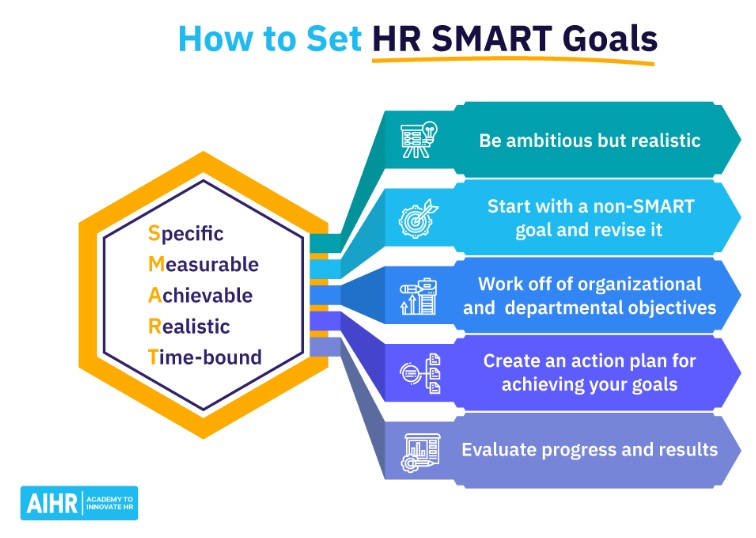How To Monitor SMART Goals And Data Collection As A School Counsellor
11th November 2024
In the dynamic landscape of education, school counselors' skills play a crucial role in supporting students' academic, social, and emotional development. One effective strategy that can significantly enhance counseling practices is the use of SMART goals combined with systematic progress monitoring and data collection. This blog will delve into what SMART goals are, how to implement them in a school counseling context, and the importance of progress monitoring and data collection.
Understanding SMART Goals
SMART is an acronym that stands for Specific, Measurable, Achievable, Relevant, and Time-bound. This framework provides a structured approach for teachers who have completed school counselor courses to set goals that can lead to meaningful outcomes for students.

Source: aihr.com
- Specific
Goals should be clear and precise. Instead of saying, ‘improve academic performance,’ a specific goal might be ‘increase math test scores by 10%.’
- Measurable
There should be a clear method for measuring progress. In the previous example, the increase in test scores can be easily quantified.
- Achievable
Goals must be realistic and attainable, given the resources available. A counselor should assess whether the student has the potential to meet the goal with appropriate support.
- Relevant
Goals should be pertinent to the student's needs and circumstances. For instance, a student struggling with anxiety might have a goal related to reducing anxiety levels in specific situations.
- Time-bound
Establishing a timeline helps maintain focus and motivation. For example, ‘increase math test scores by 10% within one semester’ provides a clear timeframe for achieving the goal.
Implementing SMART Goals in School Counseling
Here are a few ways you can implement smart goals in your counseling sessions:
1. Identify Student Needs
The first step in setting SMART goals is to assess the individual needs of students. Collecting information on students' academic performance, social skills, and emotional well-being.
Engaging in one-on-one discussions to understand students’ challenges and aspirations. Gaining additional perspectives on students’ strengths and areas for growth.
2. Set SMART Goals
Once the needs are identified, work collaboratively with students to formulate their SMART goals. This not only empowers students but also ensures that they are invested in their growth.
A student dealing with social anxiety might aim to participate in one classroom discussion per week for the next semester.
3. Develop an Action Plan
Creating an action plan is crucial for achieving SMART goals. Identify the resources and interventions that will be used to support the student.
For instance, if a student wants to improve their study habits, the counselor might suggest weekly check-ins and the use of planners. Engage teachers, parents, and peers to create a supportive environment for the student.
4. Monitor Progress
Progress monitoring is an ongoing process that allows counselors to track students’ advancements toward their goals. Schedule consistent meetings to discuss progress and adjust strategies as needed.
Use quantitative and qualitative data to assess progress. This could include grades, attendance, behavioral reports, and self-assessments.
What Is The Importance Of Data Collection?
Data collection is vital for effective progress monitoring and goal setting. Here’s why:
- Informs Decision Making
Data provides objective evidence of a student’s progress and helps counselors make informed decisions about necessary adjustments to interventions or support strategies.
- Enhances Accountability
By tracking data, counselors can hold students accountable for their progress. When students see tangible evidence of their improvement, it can boost motivation and reinforce their commitment to their goals.
- Facilitates Communication
Having clear data allows counselors to effectively communicate progress to students, parents, and teachers. This collaborative approach fosters a supportive environment and ensures that everyone is aligned in their efforts to help the student succeed.
- Identifies Trends and Patterns
Collecting data over time can reveal trends and patterns that might indicate broader issues within a school or specific demographics. This insight can guide program development and school-wide initiatives to support student well-being.
Best Practices for Data Collection
When it comes to data collection, school counselors should consider the following best practices:
1. Use a Variety of Tools
Employ a mix of qualitative and quantitative tools for data collection. Use standardized tools to gauge academic performance, social skills, and emotional health. Document behavioral changes and interactions in various settings. Encourage students to self-reflect and provide feedback on their progress.
2. Maintain Confidentiality
Data collection must respect students’ privacy and confidentiality. Ensure that sensitive information is handled securely and shared only with those who need to know.
3. Regularly Review Data
Schedule regular intervals to review collected data. This could be monthly or quarterly, depending on the goals set. Reviewing data allows for timely adjustments to interventions.
4. Celebrate Successes
Recognize and celebrate when students achieve their SMART goals. Celebrations can motivate students to continue striving for improvement and reinforce a positive school culture.
Bottom Line
Incorporating SMART goals and systematic data collection into the practice of school counseling can lead to significant improvements in student outcomes. Diligent progress monitoring and data collection enable counselors who have pursued child counseling courses for teachers to tailor their approaches, foster accountability, and ultimately create a more supportive environment for student success. By embracing these practices, school counselors can truly make a difference in the lives of their students.
We believe education should be accessible for everyone. That’s why we don’t charge for our blogs. Find the right course that will help you in your career with us, contact us at - 1800–212–6400. You can mail us at act@asiancollegeofteachers.com.
Written By : Sanjana